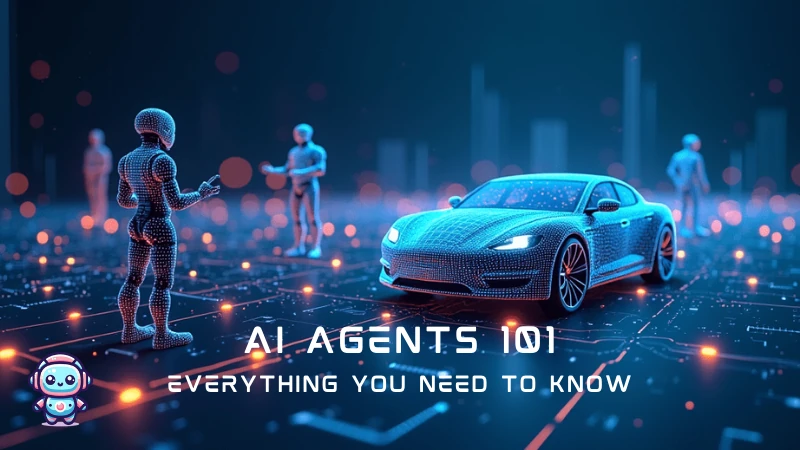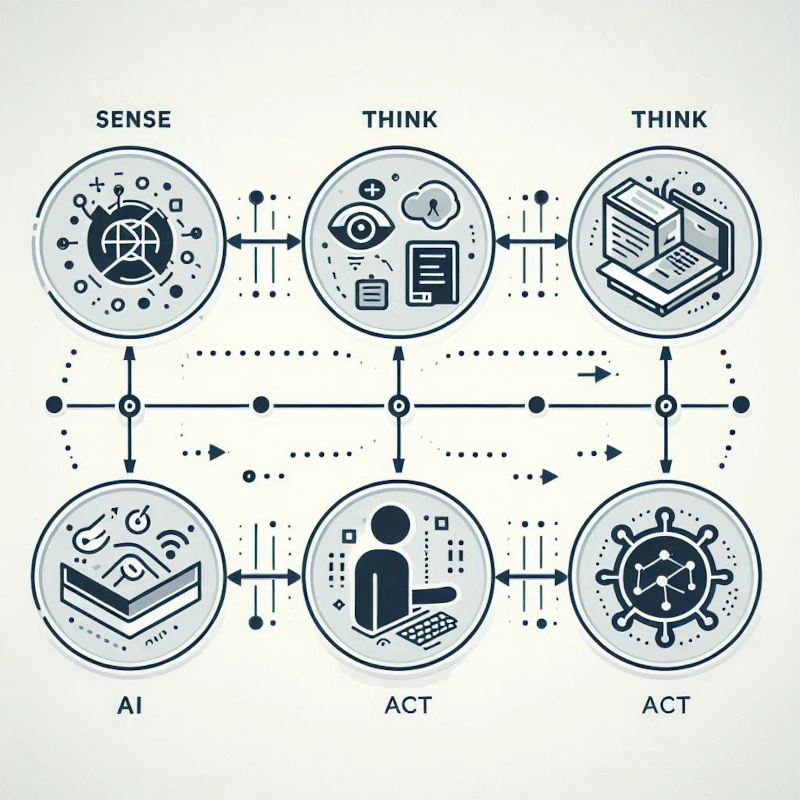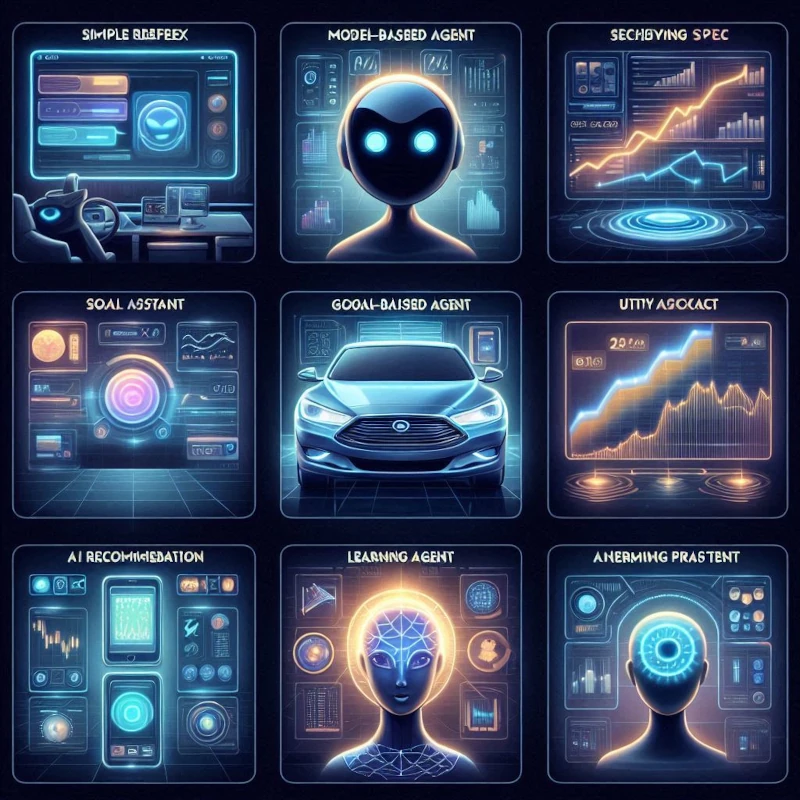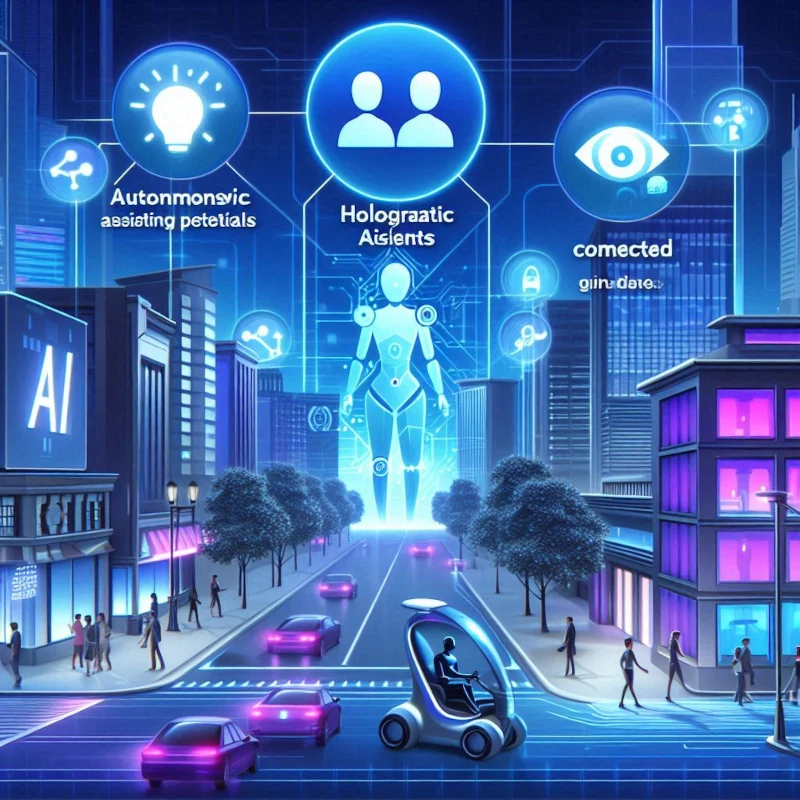
Introduction
AI agents are showing up everywhere, from chatbots like ChatGPT to voice assistants like Alexa, and even in complex systems that power finance, science, and automation. While the idea of a computer thinking and acting on its own might seem futuristic, the reality is that AI agents are already woven into the apps and gadgets we use every day.
In this guide, we’ll break down what AI agents are, how they work, the different types, their benefits, real-world applications, and future trends. Whether you’re just curious or considering AI-powered tools for your work, this article will give you a solid foundation in AI agents.
What Is an AI Agent, Really?
An AI agent is simply a program or computer system that takes in information from its environment, decides what to do based on that info, and then acts on it. It’s the digital equivalent of getting your bearings, picking your next move, and doing it, similar to how a person makes a quick decision in traffic or a pet figures out where to run in a backyard.

The Sense-Think-Act Cycle
What makes something an “agent” is its ability to:
✔ Observe what’s happening (sense)
✔ Process information and determine the best action (think)
✔ Act based on its decision (act)
AI agents perform a wide range of tasks, including answering questions in chat apps, analyzing large datasets, controlling robots, optimizing business workflows, and even recommending content or financial strategies.
The Five Types of AI Agents Explained
AI agents vary in complexity, memory, and learning capabilities. There are five main types, each one with its own perks and limits:
1. Simple Reflex Agents
These basic agents follow preset rules and react to direct stimuli. They don’t “think ahead”—they simply respond to inputs. Example: A thermostat that turns on when the temperature drops below a certain level.
2. Model-Based Reflex Agents
These agents maintain some memory of past interactions, allowing them to make better decisions when the immediate environment doesn’t provide enough information. Example: A chatbot that remembers a recent user inquiry and adjusts its response accordingly.
3. Goal-Based Agents
Instead of just reacting, goal-based agents analyze situations and decide how to move toward a specific objective. Example: A GPS navigation system calculating the best route based on traffic conditions.
4. Utility-Based Agents
These agents go beyond simply reaching a goal—they weigh multiple options to determine the best outcome based on a set of criteria. Example: AI-powered stock trading systems evaluating multiple investments for maximum return.
5. Learning Agents
The most advanced type, learning agents improve over time by analyzing feedback and adjusting their actions accordingly. They evolve based on successes and mistakes, continuously refining their processes. Example: Netflix’s recommendation algorithm adapting based on user preferences.

How AI Agents Make Decisions
AI agents process inputs (data from sensors, text, speech, images, etc.), apply rules or machine learning algorithms, and generate outputs (actions, recommendations, responses).
Decision-Making Process
- Basic AI agents follow predefined rules (if X happens, do Y).
- Advanced AI agents use machine learning models to assess multiple scenarios and predict outcomes dynamically.
- Deep learning-powered AI (like AI assistants) process vast amounts of information to generate human-like responses.
Benefits of AI Agents
AI agents bring significant advantages to businesses, automation, and everyday life:
✔ Automation – Reduces manual workloads by handling repetitive tasks.
✔ Improved Decision-Making – AI analyzes vast amounts of data faster than humans.
✔ Cost Efficiency – Businesses use AI agents to minimize operational costs.
✔ Scalability – AI-powered systems expand capabilities without hiring additional staff.
These features are backed by research from places like The University of Birmingham and are becoming more common as computing power grows.
Real-Life Examples of AI Agents
You don’t need to look far to find AI agents in action. Here are some clear examples you’ve probably seen or used:
- ChatGPT
This advanced chatbot from OpenAI is a solid example of an AI agent. ChatGPT reads your prompt, pulls from its huge model of language patterns, and responds in a way that seems natural. It acts as a learning agent, constantly updating itself over time with more data and improved techniques. So if someone asks, “Is ChatGPT an AI agent?” the answer is definitely yes. - Alexa and Voice Assistants
Smart speakers like Alexa and Google Assistant are popular AI agents. They sense voice commands, decide what you want, and act by playing music, controlling lights, or searching the web. Alexa might start simple (following commands) but can also learn user habits, making it a bit of a learning agent as well. If you’re wondering, “Is Alexa an AI agent?” The answer is absolutely yes. - Self Driving Cars
Companies like Tesla and Waymo depend on utility based and learning agents that juggle thousands of sensory inputs every second to make decisions such as braking, turning, or changing speed to keep people safe on the road. - Recommendation Systems
Netflix, YouTube, and Spotify use learning agents to pick out content you’d probably enjoy, constantly refining their recommendations and predictions of what users want based on your feedback and habits.
Getting Started With AI Agents
If you’re curious about building or experimenting with AI agents yourself, you don’t need to be a computer scientist to get started. Educational platforms and open source libraries make exploring AI agents pretty accessible, even for beginners. Python frameworks like OpenAI Gym are great if you want to experiment with teaching agents how to play games or control robots in a virtual world.
Some terms and features are worth knowing:
- Environment: The world (real or digital) where the agent operates, such as a game board, a smart home, or the internet.
- Percept: What the agent senses (input), like user commands, sensor readings, or images.
- Action: What the agent does in response, such as sending a message, flipping a switch, or planning a route.
- Policy: A set of rules or a learned strategy for picking actions based on what the agent senses.
Roadblocks: Challenges of AI Agents
AI agents aren’t magic, and building truly reliable ones isn’t always easy. Here’s where things can get tricky:
- Uncertainty and Messy Data: Real environments are messy. Sensors can break, users might say odd things, or the internet might glitch. AI agents need tools to handle randomness or incomplete info, so they don’t freak out or make wild guesses.
- Bias and Fairness: If an agent learns from biased data, it can make unfair decisions. Developers put a lot of work into cleaning up training data and monitoring agent behaviors to avoid trouble.
- Ethical Choices: Sometimes, agents face tough ethical choices (think self driving cars in complicated situations). These cases are still debated by researchers, tech companies, and regulators. More info can be found at Princeton’s AI Ethics Lab.
- Security Risks: Hackers might try to trick or take over AI agents in everything from chatbots to cars, so safety checks are really important.
Dealing with Uncertainty
One way developers handle uncertainty is by building agents to make the best guess possible, even when they don’t have all the information. Probability models and flexible strategies help agents avoid getting stuck or doing something totally useless if things change suddenly.
Bias and Learning
Since learning agents update their approach based on new data, it’s crucial to give them balanced, well chosen samples. Otherwise, the agent might just keep making the same mistakes or treat some groups unfairly.
Tips for Using AI Agents in Everyday Life
You don’t have to create your own AI from scratch to make the most of these systems. Here’s how to get smarter about using AI agents that already live in your apps and devices:
- Set privacy settings to control how much data AI agents can use about you. For example, Alexa lets you review and delete voice recordings.
- Customize agent preferences. Adjust what music, news, or reminders they bring up for you, so you get more relevant results.
- Try automation features in smart home devices. Many use AI agent tech to handle routines and patterns in daily life, saving you time and effort.
Frequently Asked Questions About AI Agents
What does an AI agent do?
AI agents sense what’s happening around them, make decisions, and then act in the most appropriate way—anything from answering a text to driving a car or playing a video game.
What are the 5 types of AI agents?
The five types are simple reflex agents, model based reflex agents, goal based agents, utility based agents, and learning agents. Each varies in memory, flexibility, and how smart it can get.
Is ChatGPT an AI agent?
Yes. ChatGPT is a kind of learning agent that chats with users, answers questions, and gets better over time as it trains on more data and feedback.
Is Alexa an AI agent?
Yes. Alexa is an AI agent that listens for your voice, figures out what you’re asking for, and responds with a helpful action or answer.
How AI Agents Will Shape the Future

AI agents are growing well beyond chatbots and home assistants. Industries are turning to agent based systems for healthcare (helping with diagnostics and reminders), finance (spotting fraud or helping with investments), and even environmental monitoring (automatically checking air and water quality). AI agents will continue advancing, integrating with emerging technologies like blockchain, Web3, and human-like virtual assistants.
Key Trends to Watch:
✔ AI-powered multi-agent systems working together to solve complex problems like coordinating disaster relief or managing smart cities. The exciting part is that these agents can learn from each other and work faster than any single program on its own.
✔ AI assistants with deeper emotional intelligence for more natural interactions.
✔ AI-driven business strategy advisors optimizing decision-making.
✔ Ethical AI development ensuring fairness, transparency, and security.
Keeping tabs on privacy, fairness, and safety as AI agents get more powerful is super important. Researchers and developers are staying focused on keeping these systems transparent and safe to use. You can find more learning resources at Google AI Education, Elements of AI, and edX’s AI courses if you want to check out more.
Conclusion
AI agents are revolutionizing industries and everyday life, offering automation, efficiency, and intelligent decision-making. Whether it’s chatbots, recommendation engines, or autonomous systems, AI agents are here to stay.
As AI continues evolving, staying informed about how AI agents work and how to use them effectively will be crucial for individuals and businesses alike.
🔹 Want to explore AI-powered tools for your work? Start experimenting with AI-driven assistants and automation tools today!
If you have ANY questions, or anything to clarify, please drop a comment below. I will be happy to help you.
I wish everyone good heath, wealth, and success!

Timotheus
AI & Digital Marketing Expert, Lecturer, Amazon Bestselling Author & Cancer Survivor
Thank you for this! Great read to help start understanding how AI agents can be used to improve work/life.
Thanks Fari! Glad you dropped by and visited. And happy to know this article helped you to understand more about AI Agents. I will be writing more content about this topic. Do visit often and look out for updates 🙂
Thanks for sharing this as I dim it valuable and worthy
It deepen my understanding about AI
Thanks a lot
You’re welcome, Enoch. I’m glad you found the information valuable, and it helped you deepen the understanding of AI Agents. I will be writing more about this topic. So, do visit again for updates 🙂